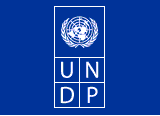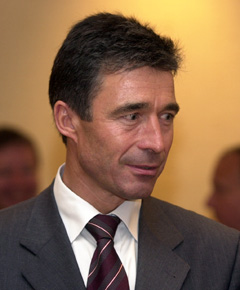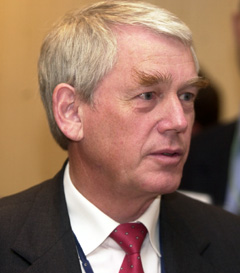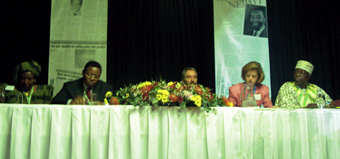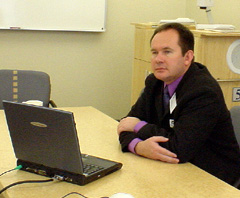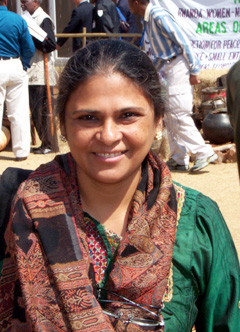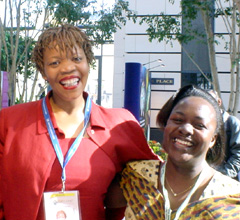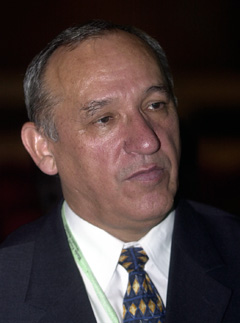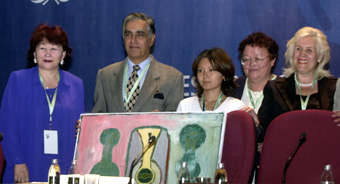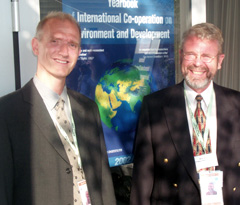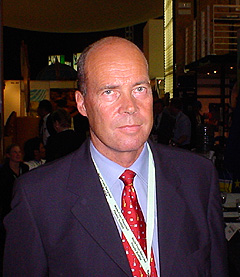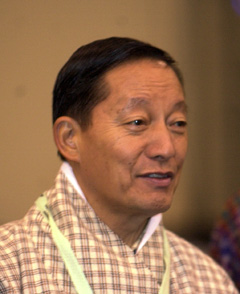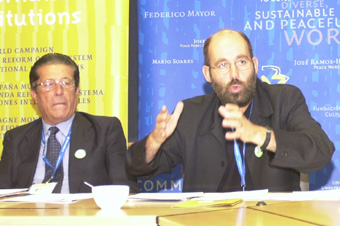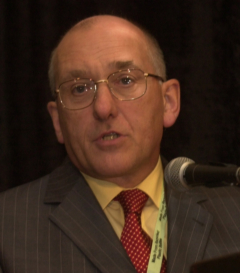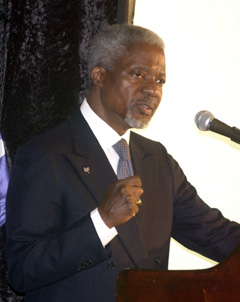|
|
|
Jørgen Henningsen, European Commission, underscored the need to ensure ownership by partner developing countries in the EU energy initiative, and emphasized long-term cooperation with stakeholders. Discussion: The Danish EU Presidency clarified that nuclear power is not part of the EU energy initiative. |
|
|
|
|
Val Giddings, Biotechnology Industry Organization, explained American and European approaches to biotechnology. He identified potential reasons for Europe's opposition to GM foods, including: history and culture; attitudes towards food and multinational corporations; recent fears triggered by the Bovine Spongiform Encephalopathy and dioxin crises; political and economic conditions; and misinformation. Klaus Ammann, Bern University, presented a comparison between genetically modified crops and organic foods. He called for a change in Europe's position towards GM foods, stressing that: research into the subject has been ongoing; organic foods have not been proven healthier or safer than GM foods; and that cross-breeding is a natural phenomenon. Laura Reischeidner, International Environmental Resources, reviewed provisions of Agenda 21 that are relevant to biotechnology, and highlighted the entry into force of the Biodiversity Convention and the conclusion of the Protocol on Biosafety. Discussion: Participants discussed various issues, including: the need for a balanced view on GM food; food security; consumers' choice and the reasons of multinational corporations' opposition to labelling; political commitment to biotechnology from the WSSD; capacity building and information; and bridging the gap between NGOs and industry. |
|
|
|
|
|
|
|
Solome Mukisa, Forum for Women in Democracy, stated that governments must work with communities to ensure achievement of goals, and explained a project mobilizing women to take action in decision-making processes. Marcial Arias, International Alliance of Indigenous and Tribal Peoples of the Tropical Forests, highlighted the capacities of indigenous peoples, underscored indigenous land rights, and advocated community-specific solutions. Discussion: Participants addressed: empowerment of women; implementation of MDG through strategic partnerships; and provision of direct funding to communities. |
|
|
|
|||||||||||||
|
Ted van Hess, European Network on Debt and Development, underscored that debt relief, cancellation and reduction are crucial means to providing additional financial resources to heavily indebted poor countries. He stressed that debt repayment should not take priority over achieving the MDG and human sustainable development. May Sengendo, Uganda, suggested that the MDG indicators should be combined with other relevant indicators to assist in implementing the MDG. She drew attention to gender indicators developed in the Beijing Declaration and Platform for Action, which reaffirms governments' commitment to eliminate discrimination against women and remove obstacles to equality. |
|
|
|
|||||||||||||||
|
Bulat Yessekin, CAREC, described activities of CAREC and its methodology for developing the regional Agenda 21. He drew attention to the lack of legal frameworks supporting civil society participation in policy development. Sestager Aknazarov, CAREC, stressed the importance of the Aarhus Convention for Central Asia, and called for a legislative framework and for international support to ensure the active involvement of civil society in decision-making in the region. Lyudmila Shabanova, UNDP, explained how the Regional Environment Action Plan in Kazakhstan was developed as a part of the Central Asian Agenda 21. Armat Bektasov, artist, highlighted the role of cultural leaders in promoting sustainable development in Central Asia and expressed support to the Earth Charter. |
|
||||||||||||||||||||||||||||||||||||||||
|
|
|
||||||
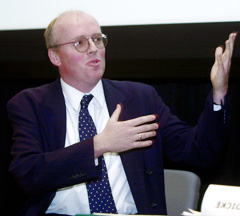 |
Is there a business case for biodiversity? Achim Steiner, IUCN, presented a statement from Queen Noor of Jordan, IUCN Patron, in which she stressed the responsibility of businesses and civil society in combating biodiversity loss. Fernando Alves de Almeida, Brazilian Business Council for Sustainable Development, highlighted the need for an adequate regulatory framework to promote investment, based on the respect of private property, intellectual property rights and free market, while giving due consideration to communities' rights. He stressed the need for ethical use of biodiversity, benefit-sharing, and transparency. Tom Burke, Rio Tinto, emphasized the importance of legal, social, and environmental responsibility of businesses, and called for greater interaction between businesses, NGOs and governments. |
|||||
|
Torsten Bartsch, Young Managers Team/Caterpillar Sarl, called on participants to help minimizing the impact of the WSSD by redistributing their conference bags to local communities. |
||||||
|
Elizabeth Lowery, General Motors (GM), highlighted GM's efforts to promote the social and environmental components of sustainable development, including sustainable water resource management and greenhouse gas reduction. She introduced GM's hydrogen-based projects. Phil Watts, Royal Dutch Shell, stated that sustainable development makes good business sense, and can create competitive advantage if appropriately conducted. He stressed the need for partnerships, early sensitization at the national level, and encouragement of all industry actors to respect protected areas. Peter Woicke, International Finance Corporation (IFC), highlighted the IFC's environment-related activities. He recommended: caution when using subsidies; transparency; an integrated approach to investment projects; long-term partnerships; and the creation of markets for environmental services. |
||||||
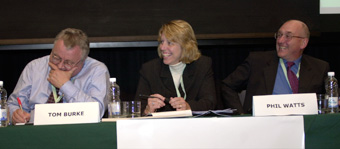 |
||||||
|
Tom Burke (left), Rio Tinto, Elizabeth Lowery, General Motors and Phil Watts, Royal Dutch Shell |
||||||
|
Torsten Bartsch, Young Managers Team/Caterpillar Sarl, presented the Young Managers Initiative, which represents young business managers' views at the WSSD and strengthens links between NGOs and businesses. Discussion: Participants addressed issues including: good governance; cooperation between all sectors of society, especially between NGOs and businesses; and creating adequate conditions for businesses. |
|
|
|
|
Robert Bertolline, WHO, noted that the YBICED demonstrates that the international community can find means and actions to overcome environmental problems. Rasmus Hansson, WWF, explained that NGOs rely on scientific evidence for their work as environmental activists and advocates, and highlighted the need to develop agreement on environmental issues. He stressed that scientific analysis continues to help the WWF and other NGOs to formulate alternatives to current environmental policies. Olav Schram Stokke, FNI, said that the YBICED provides: a summary of international agreements on environment and development, an analysis of environmental governance, and a review of countries' performances in implementing commitments. Stokke stressed that the YBICED allows governments, the private sector, NGOs, the media and others to assess governments' compliance of environmental agreements. |
|
|
|
|
Michael Meacher, UK Minister of the Environment, noted that approximately USD 12 billion of revenues are lost annually as a result of illegal logging, and highlighted the UK's commitment to ensuring legality of all imported timber. Jan McAlpine, US, noted that recent conferences in Asia and Africa on forest law enforcement and governance constituted important steps towards addressing these issues. Kevin Gray, Royal Institute of International Affairs, noted the difficulties in defining illegality, and emphasized that legal forest management may not always be sustainable. Agus Purnomo, WWF-Indonesia, highlighted greed and poverty as the main causes of illegal logging, and underscored the need to address corruption. Estheringe Lisinge, WWF-Cameroon, called for independent monitoring of forest concessions, and stressed the need for efficient involvement by civil society. Henson Moore, American Forest and Paper Association, noted the industry's limited capacity to combat illegal logging, and called for partnerships with governments and NGOs. |
|
|
|
|
Piter van Geel, Netherlands Minister of Housing, Spatial Planning and the Environment, explained that under previous bilateral SDAs the cooperation between partner countries remained minimal, and expressed hope that the new partnerships would contribute to greater cooperation in implementing the WSSD outcomes. The Ministers signed the agreement on south-south cooperation for sustainable development, which is open for new interested partners. The participants were presented with a documentary that illustrated the experiences and lessons learned from implementing SDAs in the four partner countries. |
|
|
|
|
Frederico Mayor, UBUNTU Forum, stressed two main challenges in ensuring good global governance. The first constitutes of creating new mechanisms to ensure that governments comply with international agreements and fulfil fundamental human rights. The second challenge is to address the needs of all people, including future generations, and to transit from the current "oligocratic" global order dominated by few nations to international governance, which is based on the culture of peace, dialogue, freedom, equality and solidarity. Mayor explained that the UBUNTU Forum aims to facilitate this transition, as well as to create international mechanisms to ensure implementation of the WSSD outcomes. He noted that one of the WSSD achievements includes highlighting the importance of the holistic approach to development. Discussion: Participants highlighted the need to: ensure consensus within civil society; discuss the role of UN organizations in the UBUNTU Forum; create synergies amongst civil society networks; incorporate the Earth Charter into the reform; and create public awareness about the campaign. |
|
|
|
||||||||||||||||
|
|
Global Village Energy Partnership The Global Village Energy Partnership, a joint UNDP/World Bank initiative, was launched on Saturday 31st August. It brings together, inter alia, developing and developed countries, public and private organizations, multilateral institutions, and consumers to ensure access to modern energy services by the poor. |
|
|

